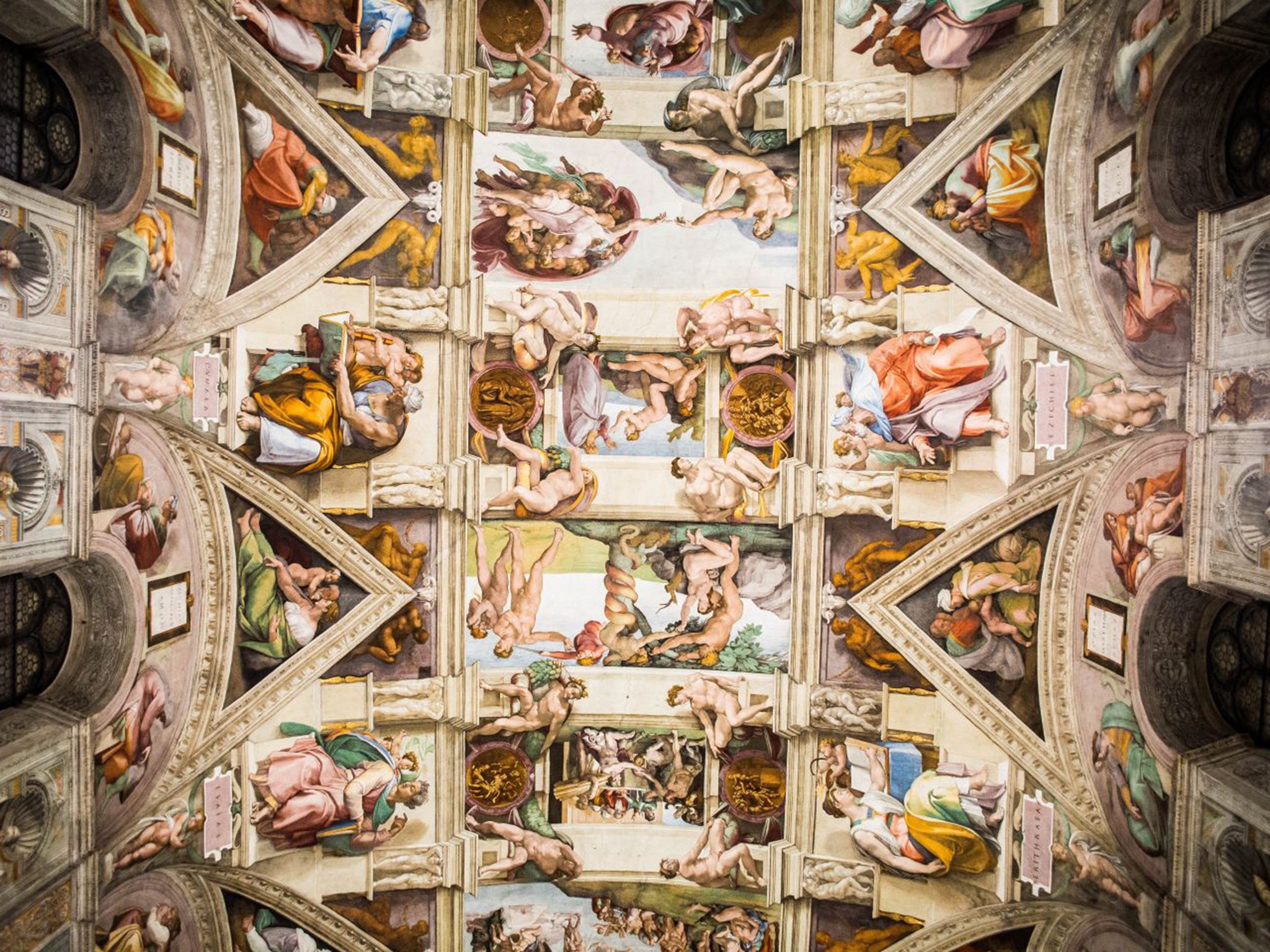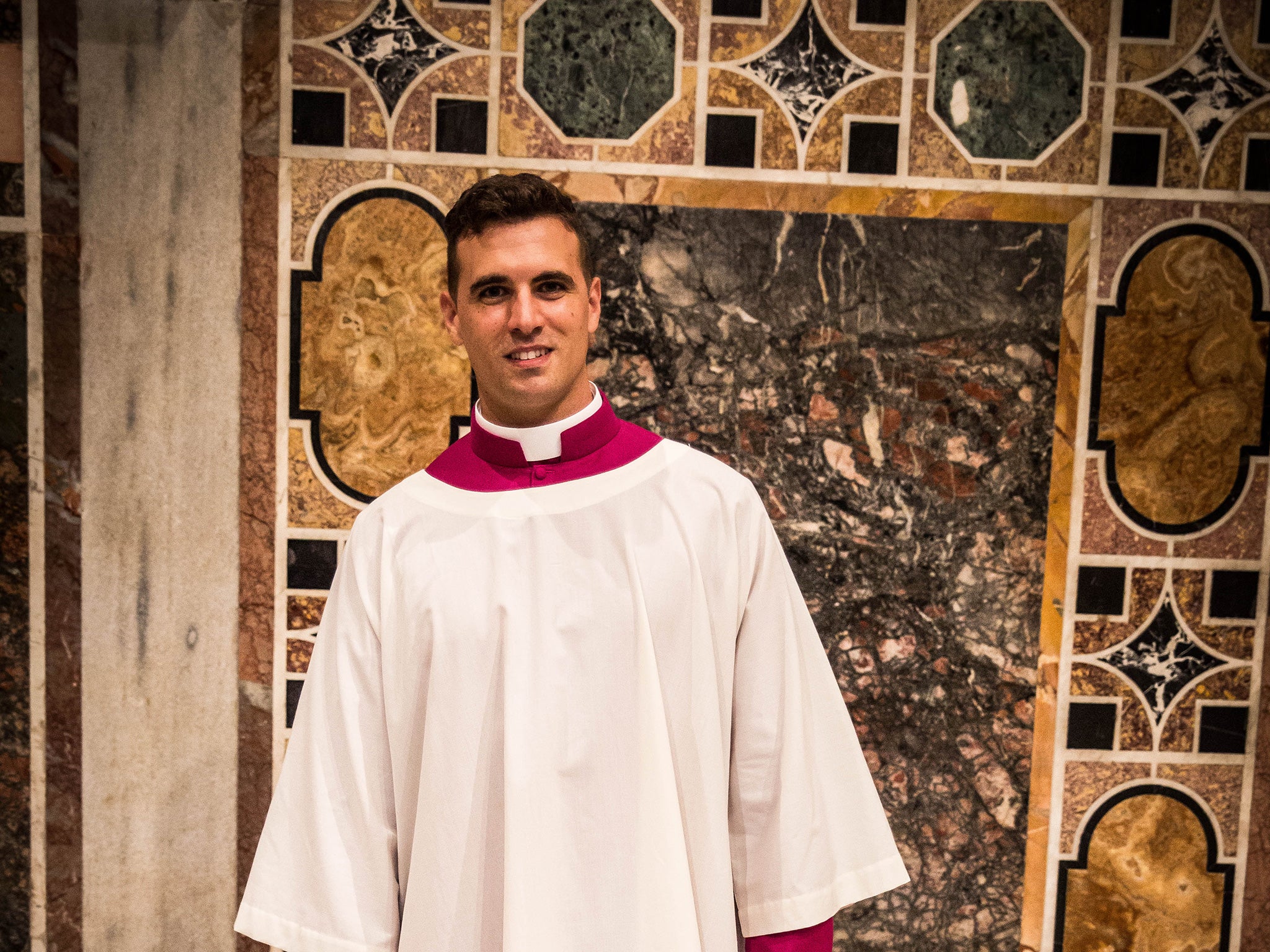Sistine Chapel Choir work on an album in the most beautiful recording studio in the world
One of the oldest choirs in the world will launch the first album in its long history, singing in Latin beneath the frescos of Michelangelo. By Cole Moreton

‘You know what happens to walls,” Pope Francis once said. “All walls fall.” He was talking about the walls that keep nations apart, but his words come to mind as the great high walls of the Vatican loom overhead. “Today, tomorrow or in 100 years, they will fall.”
This is the place that John Paul II called “a gilded cage”. Pope Francis is determined to resist the grandeur of the medieval fortress state, refusing the Apostolic Palace for a room at the guesthouse where he stayed before he was elected.
I have come to look for a man who works at the heart of the Holy City, in the spectacular surroundings of the Sistine Chapel, where something remarkable is about to happen.
One of the oldest choirs in the world will launch the first album in its long history, singing in Latin beneath the frescos of Michelangelo.

“This music was written when the paint was virtually still wet,” says Mark Spyropoulos, who will take his place among the 20 men and 30 boys who are the Pope’s personal singers, as the first British person ever to work full-time with the Sistine Chapel Choir.
Getting in to see him gives a rare glimpse into the tiny world in which the Pope lives when he is not on tour; as well as the tug of war between the instinct of His Holiness to speak up for the poor and the magnificent Church structure that enfolds and threatens to engulf him.
Pope Francis is attempting to reform the way the Vatican is run and has put its bank into the hands of an ally, asking him to break the dubious but long-held ties with Italian business and politics.
“The Court is the leprosy of the papacy,” he said with shocking frankness soon after his election, referring to the men who run the Vatican, the Roman Curia. Last Christmas he gave them his heart, in the form of a list of 15 sins he felt they were suffering from.
Spiritual Alzheimer’s disease was one: forgetting the love of Christ. “We see this in those who build walls around themselves and who increasingly transform into slaves to the idols they have sculpted with their own hands.”
Excessive planning, living a double life, destroying lives with gossip, being vain, and trying to fill an empty heart by chasing after wealth and power were all among the faults he found in the members of his administration.
No wonder he likes to visit other places so much.
The images of a smiling, hugging, happy Pope on his tour of America contrast strongly with the stern faces of the elderly clergy who populate the Holy City.

Today the bishops of the world will be here for a synod on morality and the family, with some highly critical of a pope they fear is too liberal. They will cause a temporary halt to the flow of pilgrims, as usually 33,000 people an hour shuffle through the Sistine Chapel, the place where the new Pope was elected by his fellow cardinals in 2013.
I dodge the queues with a small group from the record label that is releasing the album, Cantate Domino, giving the Pope an outside chance of a Christmas Number One. The choir master, Massimo Palombella, explains: “Pope Francis said ‘You must work with Deutsche Grammophon. It is very important, it is the best.’ It is a way of contacting the person who is far away from the Church.”
We follow an art historian through magnificent halls, listening to him say at least four times that a piece of art or decoration was commissioned by a pope to “celebrate the victory over Martin Luther”. The old monk would be delighted to still be under their skins.
Then a huge door opens, a man in a dark suit steps aside and we gasp at the scale of the Sistine Chapel, craning our necks to look upwards. There is God reaching out to Adam, who lifts his hand rather listlessly. But this famous image is just one panel on a vast ceiling.
The eye quickly falls down past the plummeting sinners of The Last Judgment, Michelangelo’s giant mural that puts Dalí in the shade for eccentricity. Standing before the altar is the choir, with baritone Mark Spyropoulos at the back.
“It is a privilege to be here,” he told me earlier, but of course it is far more complicated and emotional than that. The cardinals and archbishops have come in their black robes and red or purple sashes and caps to hear the choir perform music that was recorded here in the dead of night. Somewhere near them is Michael Oakley, the head of music at Worth School in Sussex, who found when he started his job way back in the 1990s that there was one little boy at the front whose eyes shone, whose voice was clear and who loved the music. Now here he is, singing in the Sistine Chapel at the age of 34, and Mr Oakley is struggling to contain his pride. “Mark is a remarkable character. He always was, as a boy. There is a vibrancy about him that is notable and unusual,” he says.
The performance is superb. The choir used to be awful, known as the Sistine Screamers, until Maestro Palombella took over five years ago and changed rehearsals from three hours a week to three hours a day. His style combines the precision of the British and European choral traditions with a warm, fluid, Mediterranean sound.
The voices drift up towards Michelangelo’s ceiling. “The Vatican, the Sistine Chapel, the music all amounts to the most extraordinary aesthetic,” Mark said before the concert. “That’s one of the main attractions for me to be here. This is the most beautiful artificial thing that humans have ever created.”
He studied at the Guildhall School of Music, then worked as a chorister and soloist. Mark came to Italy seeking to join one of the opera houses, but was directed to Palombella, who gave him work, then a full-time contract in the summer.
What is it like to work in this unusual place? Mark commutes from his apartment in San Lorenzo every afternoon, but is also on call. “I went on holiday to Oslo but when I got there I received a call saying ‘A cardinal has died, the funeral is in two days, get back here.’ ”
Is there pressure on him to be a good, clean-living boy? “I think that is expected. And I am a good, clean-living boy,” he says with a smile. What about faith? “The level of faith is a private matter. They simply ask if you are a Catholic, which of course I am.”
Can his faith survive working at the very heart of the Church? He thinks long and carefully before answering, then says he is “fascinated” by being here. That’s a good word. It enables someone like me with doubts and questions to sit and marvel at the purity of the voices and the skill of the artist, even if the frescoes are bizarre and the centuries-old display of wealth and power disturbing.
Mark was ambushed unexpectedly during the recording of the album. “We were singing one of the Palestrina motifs to the empty chapel at 10 o’clock at night. This music goes incredibly deep. It is spiritual, meditative, reflective, mysterious. I had this feeling of being completely transported, somewhere far away. It was almost like an out-of-body experience. That has never happened to me before.”
It came without warning, as did his chance to meet the Pope on New Year’s Day. “Half an hour before the concert, Maestro Palombella said ‘Follow me.’ I thought I had done something wrong. I walked through all these huge baroque chapels and was put in front of this line-up of dignitaries all in various types of fancy dress. A priest said: ‘Do you know what will be happening now? You will be meeting the Holy Father.’ ”
For a moment, Mark panicked. “I’ve never met a pope before. I don’t know how to meet a pope, and I’m the first in line. Do I have to kiss his feet or something? What is the protocol? There was no time for anyone to explain. The curtains parted and in walked the man in white.”
They were introduced and shook hands. “The Pope said: ‘You are from London? You are singing with us? That’s wonderful! Welcome to the Vatican!’ He was extremely welcoming, much more than he would need to be, and made me feel that I was really here to be part of something.
“There’s a real sense of joy and optimism with this Pope. When I walk across St Peter’s Square, the people there really seem to love him. There is a very upbeat feeling in the Vatican at the moment.”
Not everybody would say so, as Pope Francis continues in his efforts to reform the place, with some of the voices raised against him getting louder. In the latest edition of the Catholic journal The Tablet, Massimo Faggioli of the University of St Thomas, Minnesota, writes: “There is no memory in modern church history of a pope called to defend himself from the accusations – coming from self-appointed guardians of orthodoxy – of being non-Catholic, a heretic, a communist. The question now is whether there will be at the synod a solution to these tensions, and, if so, what form it will take.”
But most of that will be invisible to the outside world, which is in love with its own idea of Francis.
And as for the real man, he asked for a few moments alone to deal with his anxiety after being elected pope. If it all gets too much again, he should go back to the place where it happened and listen to Mark and his other personal singers.
Then at least he will know that even here, in this place of high walls, harsh words and glaring wealth, there is still beauty – simple, staggering, transcendent beauty – in his world.
Join our commenting forum
Join thought-provoking conversations, follow other Independent readers and see their replies
Comments
Bookmark popover
Removed from bookmarks